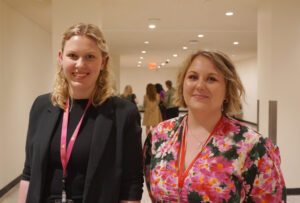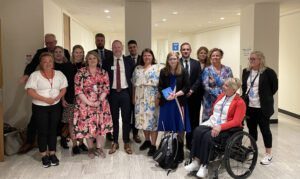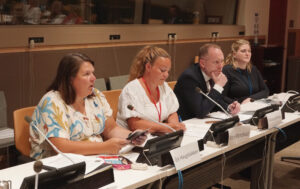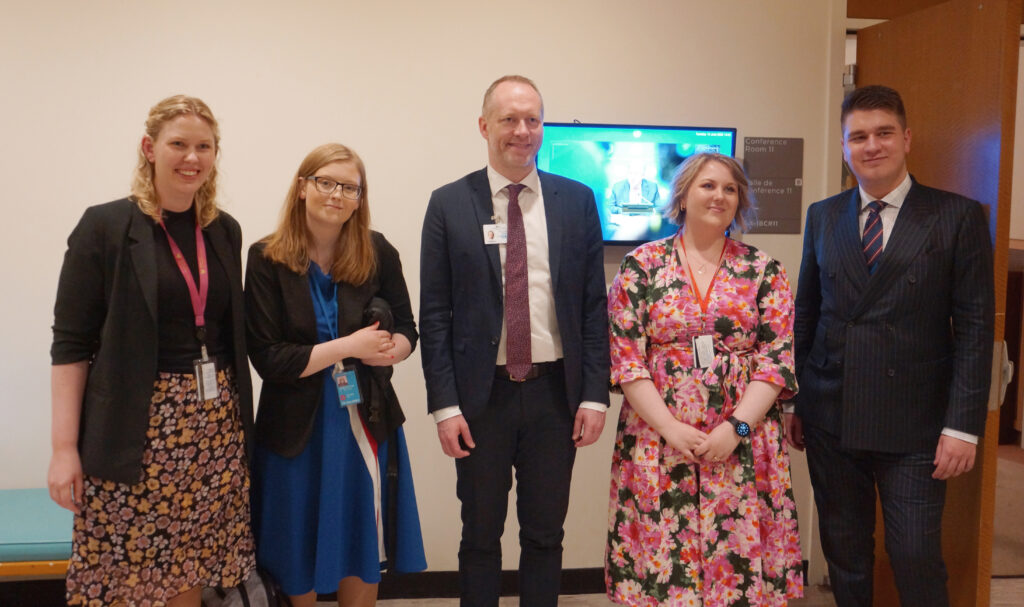Involving users is the key to better digital services for persons with disabilities
Vammaiskysymykset
22 kesä 2023
Successful co-creation of new digital services for persons with disabilities is possible, but including the users from the start of the process is necessary for success. Both strategies and practical issues concerning co-creation were highlighted at the Nordic side event at the United Nations conference of State Parties to the UN Convention of the Rights of Persons with Disabilities (CRPD) in New York.
The Nordic side event during the conference of State Parties to the UN Convention of the Rights of Persons with Disabilities, or COSP16, was headlined Co-creating digital solutions for persons with disabilities – Policies and strategies for tomorrow´s digital challenges.
Representatives for youth disability organisations in the Nordic countries gave hands-on advice on what to remember when planning and working with co-creation.

Johanna Forsberg from Youth with Disabilities Federation, Sweden, highlighted the need to include persons with disabilities in the co-creation process.
– We need to use an intersectional approach when services are designed, and we need to include persons with disabilities in the early stages of the process. I would like to emphasize that young people need to be included, says Johanna Forsberg.
Siri Espe from the Norwegian Association of Youth with Disabilities pointed out the continuous need to raise awareness about persons with disabilities.
– This should also include increasing knowledge about universal design among those who create digital solutions. If those who design services see the world through disability glasses, they will design more accessible solutions, which will be better for everyone, says Siri Espe.
Health data is a solid base for co-creation
At Nordic Innovation, the programme Health, Demography and Quality of Life has identified the sharing of health data as a key factor for change and for intensifying the Nordic co-operation when it comes to increasing the quality of health, preventive measures and innovation.
– We, the Nordic countries, can be the trendsetters. This does not mean that the road is free from obstacles, but we are quite positive that if we work together, we can overcome the obstacles, says Thordur Reynisson, Senior Advisor at Nordic Innovation.
The need for better data has also been brought up in the ongoing co-creation process in Iceland. In endeavors to address temporary obstacles in the development of accessible digital solutions for all, the authorities in Iceland are in the process of implementing an innovative digital scheme.

Guðrún Ágústa Guðmundsdóttir and Thor Thorarinsson from the Icelandic Ministry of Social Affairs and Labour shared strategies and experiences from the process.
– Most of the working groups in Iceland call for better data, more research and better monitoring in all areas. We are good at decision-making, but we are not good at executing it, and we are even worse at monitoring it, says Guðrún Ágústa Guðmundsdóttir.
The need for reliable and usable data was also pointed out by the youth organisations.
– Disability organisations cannot influence decision makers without data. We need data to support the problems we are describing and the solutions that we are suggesting, says Johanna Forsberg from Youth with Disabilities Federation in Sweden.
Co-creating solutions to share with other countries
During its presidency in the Nordic Council of Ministers, the Icelandic government has put electronic access for persons with disabilities on the agenda within the Nordic cooperation, Icelandic Minister of Social Affairs and the Labour Market Guðmundur Ingi Guðbrandsson explained at the side event.
– I really hope that the solutions that are in the making in Iceland will also help other countries to prevent or overcome similar barriers, says Guðmundur Ingi Guðbrandsson.
Iceland has already made a significant advancement with the creation of a database of personal electronic advocates, with the aim to help persons with disabilities that are unable to obtain their own electronic ID to still access health and bank information.
Collaboration over borders and sectors
Gry Haugsbakken, State Secretary at the Ministry of Culture and Equality in Norway presented policies and strategies for inclusive digital solutions from a Norwegian perspective.

– We need to collaborate across countries, agencies and sectors to create seamless services that meet the needs of the user, regardless of who provides the service, says Gry Haugsbakken.
The Norwegian government’s vision is one where everyone can participate. Gry Haugsbakken underlines that digital exclusion has a high cost. It is difficult to perform tasks on websites without the necessary digital competence, and that leads to a risk of losing out on an equal access to service or products provided by both the public sector and private enterprises.
“Let them see the world through our eyes”
The Nordic countries agree that a stronger focus on accessibility and user-friendliness is needed for developing better digital solutions for welfare services for persons with disabilities. The youth representatives at the side event agree and point out the need for more direct interaction to make the developers of new digital solutions aware of the needs of persons with disabilities.
Sunna Dögg Ágústsdóttir from Iceland´s National Association of People with Intellectual Disabilities says that when it comes to digital services, it currently feels like persons with disabilities are a forgotten group.
– For the future, we must educate technology makers and industry professionals about disability and let them see the world through our eyes, because it doesn’t have to be this way. It could so easily be better, says Sunna Dögg Ágústsdóttir.

Aiheeseen liittyviä uutisia
Hyvinvointipolitiikka
30 syys 2020

